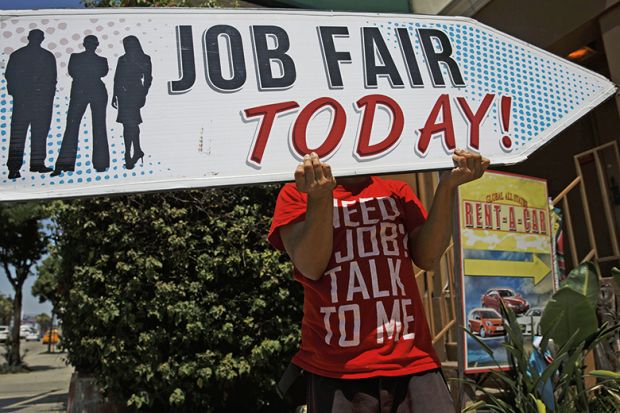US universities that resist having a “labour market mission” will “fail” when it comes to their “higher-minded pursuits”, an expert has warned, after Donald Trump proposed merging the federal departments of Education and Labor.
Last month, the US president announced a plan to unite the two departments into a single agency that would focus on “how best to develop the skills needed to succeed in the 21st-century economy”. Mr Trump has previously pledged to eliminate or drastically shrink the Department of Education.
Initial news reports warned that such a move – while deemed unlikely to win Congressional approval – could reinforce the utilitarian notion that the only value of universities is their ability to prepare graduates for careers.
But Anthony Carnevale, research professor and director of the Georgetown University Center on Education and the Workforce, which studies the link between education, career qualifications and workforce demands, said that the merger would be a “win-win for educators and the public” because it would result in the “democratisation of education”.
“In the US, education drives earnings and employment opportunity much more than it does in other countries because of the lack of a strong welfare state here,” he said.
However, he lamented that “higher education is resisting a labour market mission mightily” because “they want to be about Shakespeare”.
“There is no reason you have to choose between the two,” he said. “The truth is that the purpose of education in a democracy is human flourishing, fundamentally; but in democratic capitalism – that is where markets are the form and shape the economy takes – you’re not going to flourish living under a bridge, you have to have a job. It’s the acceptance of a dual mission that’s really at issue here.”
Dr Carnevale told universities that “if you give somebody a very good education and they can’t get a job, you’re going to fail on all your higher-minded pursuits”.
He said that a common view is that the government does not need to restructure to better connect the Education and Labor departments, but he called this “naive”.
“Over the past decade, federal government states have built out information systems that track [publicly funded degree] programmes to employment wages, but the data is not used and they haven’t nationalised it,” he said.
Terry Hartle, senior vice-president in the division of government and public affairs at the American Council on Education, said that the merger proposal was “illustrative of the debate in America about increasing the relationship between education and the workforce to establish a closer connection between educational institutions and employment opportunities”.
But he said that while “closer cooperation and coordination between the departments of Labor and Education would be very desirable”, a merger is “likely to be relatively pointless”.
“Cabinet agencies tend to be like ocean-going freighters. They’re difficult to slow down and move in a different direction,” he said.
Mr Hartle also rejected the notion that a merger would push institutions to prove that their courses were linked to the labour market.
“I don’t think it puts more pressure on institutions. I think institutions are already feeling it, and I think the sorts of debates in Washington about the structure of government are at a relative distance from what colleges and universities are trying to do on a day-to-day basis,” he said.
Register to continue
Why register?
- Registration is free and only takes a moment
- Once registered, you can read 3 articles a month
- Sign up for our newsletter
Subscribe
Or subscribe for unlimited access to:
- Unlimited access to news, views, insights & reviews
- Digital editions
- Digital access to THE’s university and college rankings analysis
Already registered or a current subscriber? Login








